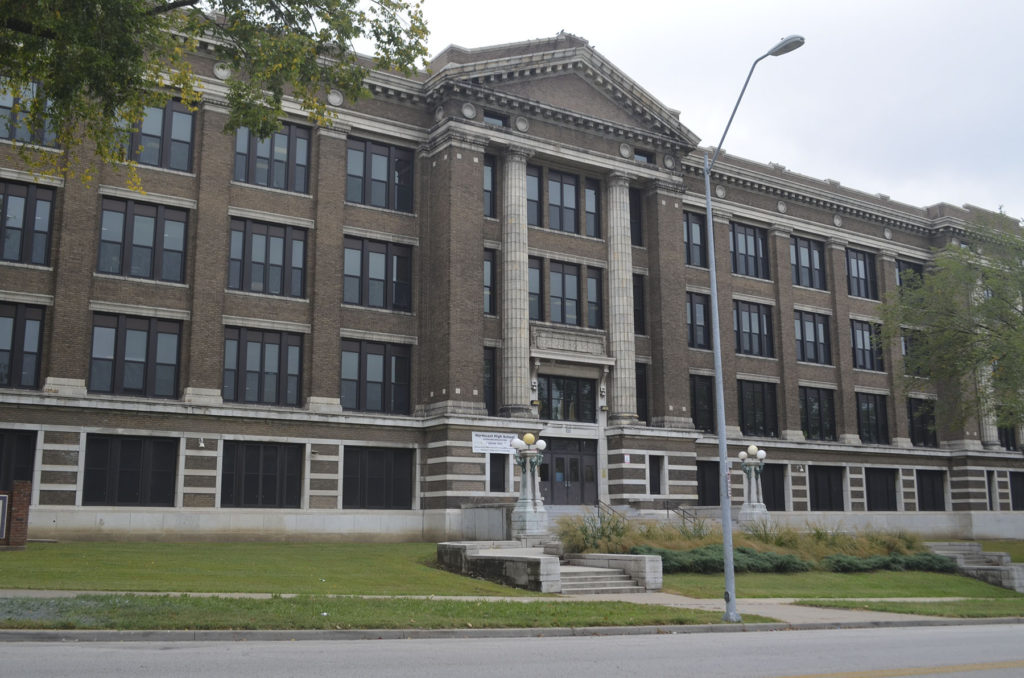
By Paul Thompson
Northeast News
Kansas City Public Schools (KCPS) earned 89.5 of a possible 140 points in its 2017 Annual Progress Report (APR), a mechanism used to decide accreditation status which was released by the Department of Elementary and Secondary Education (DESE) on Wednesday, November 15.
The 63.9% of possible points matches the district’s output from 2015, but falls short of the 70% (98/140) of APR points reached in 2016. The results from last year were a decades-in-the-making feat which led to a district-wide celebration.
KCPS Superintendent Dr. Mark Bedell was thrilled when the APR results were released last year.
“This is the first time in about 30 years that KCPS has earned the points to become a fully accredited school system,” said Bedell. “The school system APR results have improved by more than 75 points in just four years.”
For context, the district earned just 22.5 of 140 points in 2012. While the 2017 results show a slight drop-off in performance, they still represent a stabilizing trend for the district, which has earned at least 60% of possible APR points every year since 2013. This year’s results ensure that KCPS will maintain its provisional accreditation status, though it will likely delay the district’s ultimate goal of reaching full accreditation. Typically, DESE looks for school districts to register two consecutive years of 70% or better APR scoring before considering a shift from provisional to full accreditation.
APR scores are determined through the fifth incarnation of the Missouri School Improvement Program (MSIP5), which rates district performance through a handful of statewide standards: Academic Achievement, Subgroup Achievement (which considers the academic performance of disadvantaged students), College and Career Ready (CCR), Attendance, and Graduation Rate. KCPS earned 29 of 56 points (51.8%) in Academic Achievement, five of 14 points in Subgroup Achievement (35.7%), 25.5 of 30 points (85.5) in CCR, six of 10 points (60%) in attendance, and 24 of 30 points (80%) in Graduation Rate.
In the Academic Achievement Standards, KCPS saw modest increases in 2017 in English Language Arts (ELA) and Science, with 35.9% (up from 35.2% in 2016) and 23.6% (22.8% in 2016) of students, respectively, scoring proficient or advanced in those categories. The district’s scores in Mathematics saw a 0.3% decrease in 2017, with 23.5% of students scoring proficient or advanced. Social Studies, however, saw the largest decline, dropping from 44.9% proficient or advanced in 2016 to 34.8% in 2017.
Attendance was another area of concern for the district. After seeing a 3.5% increase in the amount of students achieving a 90% attendance rate in 2016 (83% of students achieved the milestone), the district fell back by nearly four percentage points in 2017, with only 79.1% of students maintaining a 90% attendance rate.
Graduation rate saw an uptick district-wide between 2016 and 2017, with the four-year rate jumping 3.3% to 71.9% and the five-year rate jumping 5.1% to 76.9%. The graduation rates at Northeast High School reflect a similar upward trend, with the four-year graduation rate increasing seven percentage points to 68.2% in 2017.
Overall, KCPS Superintendent Dr. Mark Bedell suggested that the APR results were ultimately encouraging for the district.
“We see a lot of reasons to celebrate in this report. We continue to trend in the right direction,” Bedell said. “The data shows that if you stick with us, you will graduate and be placed on a very positive college or career track.”
As for local charter schools, Scuola Vita Nuova saw a slight increase in its APR score in 2017, earning 69 of 80 points, good for 86.3% of possible points. In 2016, SVN had earned 68 of 80 possible points for an 85% score. SVN saw a slight bump in attendance rate in 2017, with 92.8% of students reaching the 90% attendance threshold versus 91% reaching the same milestone in 2016. Academic Achievement remained largely steady, though SVN did record a 3.5% boost in students scoring proficient or advanced in Mathematics, along with a 3.7% decrease in students scoring proficient or advanced in Science.
Frontier School of Innovation earned 105.5 of 140 possible points, good for 75.4%. The score represents a slight drop-off from 2016, when the charter earned 118 of 140, or 84.3%, of possible points. A bright spot for Frontier was its four-year graduation rate, which saw a 6.7% increase from 2016 to 86.7%. The school earned 30 of 30 possible points in the Graduation Rate standard. The biggest individual drop-off for Frontier School of Innovation was in Mathematics, which saw a 7.2% decrease in students scoring proficient or advanced. The Mathematics scores dropped from 31.4% proficient or advanced in 2016 to 24.2% in 2017.

















